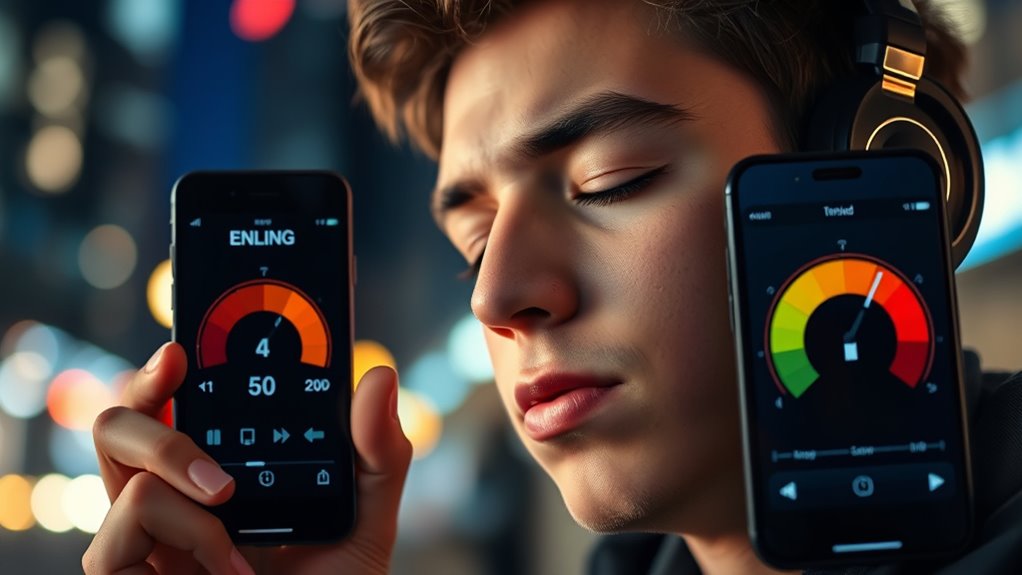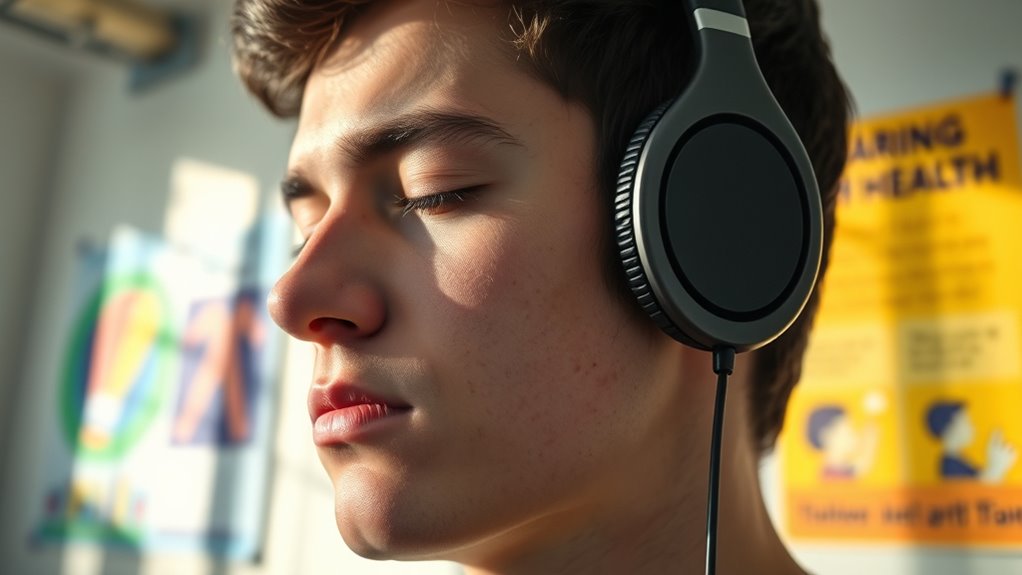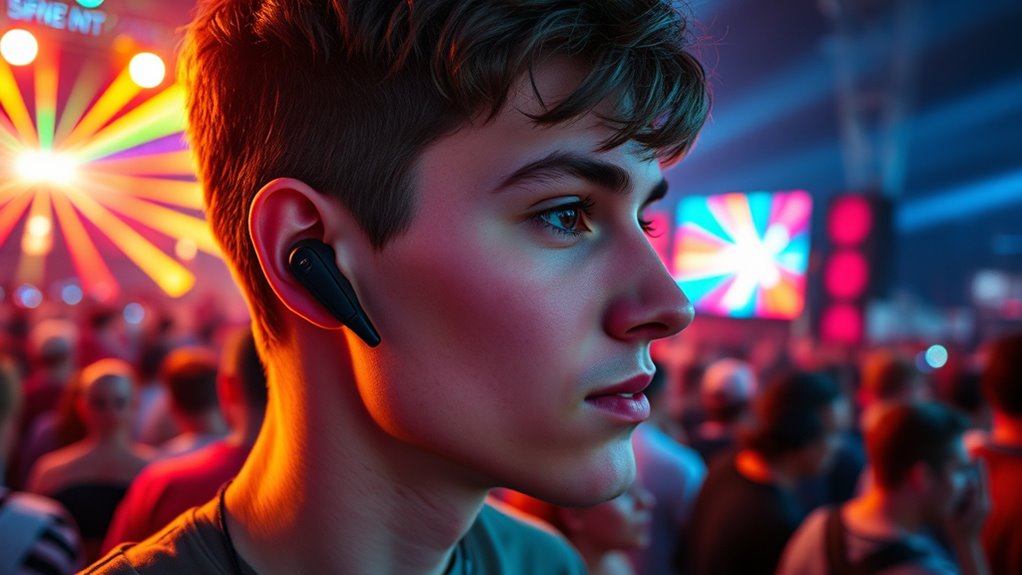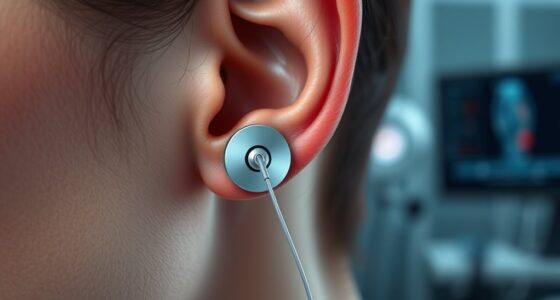To prevent noise-induced tinnitus, protect your ears from loud sounds by using earplugs at concerts, sports events, or noisy venues. Take breaks from loud environments and choose quieter spaces when possible. Maintain good ear health by avoiding prolonged exposure to loud music, managing stress, and practicing safe listening habits. Watching your lifestyle, like reducing caffeine and ensuring proper ear protection, can make a big difference. Keep going to discover more ways to safeguard your hearing for the long term.
Key Takeaways
- Wear high-quality ear protection like earplugs or noise-canceling headphones in loud environments.
- Limit exposure to loud music and take regular breaks during noisy activities.
- Recognize early signs of tinnitus, such as ringing or buzzing, and seek prompt hearing assessment.
- Avoid prolonged use of handcrafted wooden products or handle them safely to prevent ear injury.
- Adopt healthy lifestyle habits, including stress management, balanced diet, and regular exercise, to support ear health.
Understanding How Noise Causes Tinnitus in Young People

Noise causes tinnitus in young people because exposure to loud sounds damages the delicate hair cells in the inner ear. When these hair cells are harmed, they can’t send accurate signals to your brain, leading to abnormal ringing or buzzing sounds—tinnitus. Repeated or intense noise exposure accelerates ear damage, which can harm your auditory health over time. The inner ear’s hair cells are essential for converting sound waves into electrical signals your brain interprets as sound. Once damaged, these cells don’t regenerate, increasing your risk for persistent tinnitus. Protecting your ears from loud noises helps preserve your auditory health and prevents irreversible damage. Understanding how noise affects your ear health is the first step toward avoiding long-term hearing issues, including tinnitus. High sound levels can significantly increase the risk of cochlear damage, emphasizing the importance of ear protection.
Recognizing the Risk Factors and Early Signs

Knowing the risk factors and early signs of tinnitus can help you take action before it becomes a persistent problem. Be alert to these indicators:
- A history of noise exposure, especially loud music or concerts, which increases your risk.
- Genetic predisposition, meaning tinnitus runs in your family, making you more susceptible.
- Early signs like ringing, buzzing, or hissing in your ears that persists beyond exposure.
- The use of certain handcrafted wooden products, which may contain materials that influence ear health if improperly handled.
If you notice any of these signs or have a history of loud noise exposure, it’s essential to monitor your hearing health. Recognizing these factors early allows you to seek preventive strategies and avoid worsening symptoms. Staying aware of your genetic background and exposure history can make a significant difference in managing tinnitus risk.
Practical Tips for Protecting Your Hearing at Events and Social Settings

Attending events and social gatherings often means exposure to loud environments, which can increase your risk of hearing damage and tinnitus. To protect your hearing, consider smart event planning by choosing quieter venues when possible and taking breaks from loud settings. When noise levels are unavoidable, earplug selection is key; opt for high-fidelity earplugs designed for musicians or noise-canceling ear protection to reduce volume without sacrificing sound quality. Carry a pair of these earplugs with you and use them when needed. Being proactive helps prevent hearing damage, so always prioritize your ear health. Planning ahead and choosing appropriate hearing protection can make social outings enjoyable while safeguarding your hearing for years to come. Recognizing the importance of dynamic communication exercises can also foster better understanding and reduce misunderstandings in social situations, ultimately supporting your overall well-being.
The Role of Hearing Protection Devices and When to Use Them

Hearing protection devices play a crucial role in safeguarding your ears during loud environments, especially when exposure is frequent or prolonged. To maximize protection, focus on three key steps:
- Choose the right earplug by considering earplug selection options suited to your activities and comfort needs.
- Ensure proper fit by inserting earplugs correctly, creating a tight seal that blocks out noise effectively.
- Use them consistently during loud events like concerts, sports games, or construction work, even if exposure seems brief.
- Remember that proper maintenance of your hearing protection devices can extend their lifespan and ensure they continue to provide effective noise reduction.
Lifestyle Changes and Habits to Reduce Tinnitus Risk

Adopting healthy lifestyle habits can markedly lower your risk of developing tinnitus. Start with diet modifications by choosing nutritious foods that support overall ear health, like omega-3-rich fish, fruits, and vegetables. Avoid excessive caffeine and salt, which can worsen tinnitus symptoms. Managing stress is equally important, as high stress levels can trigger or intensify ringing in your ears. Practice relaxation techniques like meditation, deep breathing, or yoga to keep stress in check. Regular exercise improves circulation and reduces anxiety, contributing to better ear health. Limiting exposure to loud environments and maintaining good sleep hygiene further protect you from noise-induced tinnitus. Educating yourself on safe listening practices can also help prevent ear damage. By making these small but consistent lifestyle changes, you can markedly reduce your tinnitus risk and improve your overall well-being.
Frequently Asked Questions
Can Tinnitus Be Reversed if Caught Early?
If you catch tinnitus early, there’s a chance for neural recovery, but reversal isn’t guaranteed. Early intervention can help prevent further damage and reduce symptoms, improving your chances of recovery. By addressing tinnitus promptly, you give your auditory system a better shot at healing. While some cases improve with time and care, it’s crucial to consult a healthcare professional quickly to maximize the benefits of early treatment.
Are There Specific Music Genres That Pose Higher Risks?
Imagine your ears as delicate gardens; some music genres are like invasive weeds that threaten to overrun them. Genres with high bass and loud volumes—like EDM or rock—pose greater risks when you use headphones. To protect your garden, limit volume and duration, especially with these genres. Always use noise-canceling headphones to reduce the need for higher volumes, helping you enjoy music safely without risking tinnitus.
How Does Secondhand Noise Exposure Affect Tinnitus Risk?
Secondhand noise exposure increases your risk of tinnitus because prolonged environmental noise can damage your hearing over time. To protect yourself, wear ear protection in loud settings like concerts or busy streets. Reducing exposure to high-volume environments helps prevent ear damage and lowers tinnitus risk. Remember, even background noise can harm your ears if you’re exposed for extended periods, so take steps to shield your ears whenever possible.
What Are the Long-Term Effects of Untreated Noise-Induced Tinnitus?
Think of untreated noise-induced tinnitus as a silent storm brewing inside you. If you ignore it, it can lead to persistent hearing problems and increased difficulty with tinnitus management over time. The long-term effects include potential hearing loss and emotional distress. Prioritizing hearing conservation and seeking early tinnitus management can help prevent these lasting impacts, allowing you to maintain better auditory health and quality of life.
Do Certain Medications Worsen Tinnitus Symptoms in Young Adults?
Certain medications can worsen tinnitus symptoms in young adults due to medication interactions and side effects. You should be aware that some drugs, like high doses of aspirin or certain antibiotics, may amplify ringing in your ears. To manage this, consult your healthcare provider to review your medications and verify proper side effect management. Staying informed helps you prevent exacerbating your tinnitus and maintains your ear health.
Conclusion
By embracing ear-aware habits, avoiding amplified atmospheres, and arming yourself with appropriate protection, you can considerably safeguard your sound sense. Staying savvy about sound sensations, steering clear of sudden, siren-like shrieks, and consistently choosing shields over silence helps halt the harmful spiral of noise-induced tinnitus. Don’t disregard the danger—dedicate daily diligence to defensive decisions and develop a disciplined, deafness-defying demeanor. Protect your hearing today to preserve your peace tomorrow.











